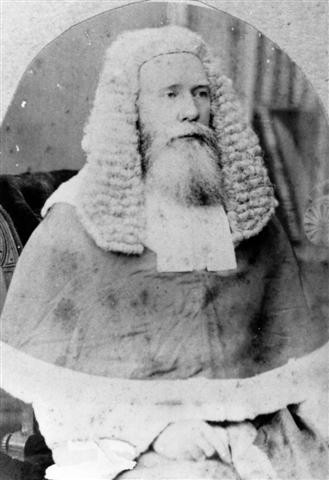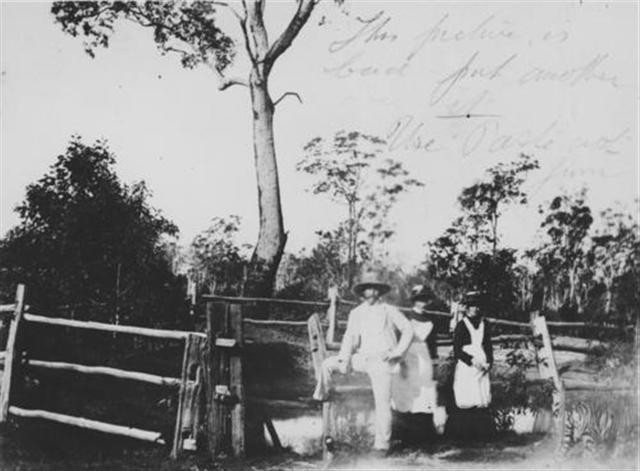Many of us have experienced difficult neighbours at some stage, but it would be hard to find anyone worse than Mr Higgins, a circus owner who operated from an allotment of land in Brisbane on the corner of George and Turbot Streets, during the late 1880s.
The unfortunate next-door neighbour, Mr Jarvis, who was a venetian-blind manufacturer, took Mr Higgins to court because of their irreconcilable differences, which came to a head because Mr Higgins’ lease on the allotment of land was not due to expire for another thirteen years! The case was brought before Sir Charles Lilley at the Supreme Court and was reported in The Brisbane Courier, Thursday 6 June 1889.

Sir Charles Lilley, ca. 1879. Image Number 73094.
The period language in the newspaper report lends to the humour of the story, so chunky quotes have been inserted in to this retelling. I’m quite sure, though, that Mr Jarvis wouldn’t have seen the funny side of this story as it was unfolding. Here is the litany of complaints he levelled at Mr Higgins:
'on or about the month of August, 1888, the defendant took possession of a vacant allotment of land at the corner of George and Turbot streets, next to the premises of the plaintiff , and deposited thereon his menagerie, consisting of a number of wild and ferocious animals and reptiles; that the said allotment of land was insecurely enclosed by a wooden hoarding built for the purpose of bill-posting; that through the negligence of the defendant and his servants, animals had from time to time escaped from the said allotment, and caused damage and great consternation and annoyance to the public, and especially to the plaintiff and the members of his family; that the plaintiff was still in great fear that the animals would again escape and seriously injure him and his family; that defendant had permitted putrefying heaps of animal excreta and refuse to accumulate immediately beneath the windows of plaintiff’s house; that the odours arising from these accumulations had been, and continued to be, highly offensive and prejudicial to the health of plaintiff and his family; that in order to avoid this annoyance plaintiff had been compelled to keep his window closed, and deprive himself and his family of proper ventilation; that defendant kept open his menagerie daily, except on Sundays, and employed certain musical instruments, which produced an incessant and irritating sound, whereby the health of plaintiff and his family had been endangered.'
From the outset, Mr Higgins was unconcerned with the comfort or well-being of his neighbour:
'As soon as defendant got fairly established he commenced to deposit the excreta of the animals about 20ft from the plaintiff’s boundary, and to burn it up with straw, causing a most disgusting and disagreeable smoke.'
…and then, of course, there was the problem of the wild animals continually escaping:
'the menagerie was kept in such a way as to keep him and his family and those about him in a continual state of terror. In November last one of the tigers escaped from its cage, and in sight of plaintiff’s house worried a man. It was true that the defendant showed wonderful courage on that occasion, and that, armed only with a small riding whip he rescued the man from death, but that did not render it any safer for the plaintiff to live in the vicinity of the menagerie. On another occasion a tiger quietly walked into plaintiff’s workshop, and by its mere presence summarily dispersed the workmen, and before the escape of the tiger previously referred to, a monkey had invaded plaintiff’s bedroom. Dingoes had also been allowed to come about the place, and there appeared in every way to be great carelessness in the management of the menagerie…The annoyance was increased in that it interfered with his wife, who carried on a dress-making business. She employed several young girls, who were so frightened that every time the tigers growled they imagined that another tiger had broken loose.'
If that wasn’t enough, the dodgy animal accommodation caused all sorts of chaos. Mr Higgins’ five tigers, five dingoes, a cheetah, a panther, a leopard and numerous monkeys were contained in cages and placed under a tent. The unhappy ending of that arrangement was inevitable:
' discomfort was further added to by the fact that the tent in which the menagerie was carried on once caught fire. Only last night it collapsed, being blown down by the high wind which prevailed.'
As a result of all of this unmonitored activity, the Jarvis family’s health was duly affected:
'One Sunday in November, while witness was lying down in his bedroom, between sleeping and waking, he was startled by seeing a monkey standing on the dressing-table, opposite the looking-glass. When the tiger escaped, witness was suffering from vomiting and symptoms of fits, and, what with the dogs screaming and the general row created by the menagerie, he thought he would die.
…The barrel-organ which defendant employed had shattered the nerves of plaintiff’s baby, and two Sundays ago the growling of the tigers caused the child to have fits.'

Author’s note:
This newspaper report was located while researching Thomas Pennington Lucas’s futuristic tale about Brisbane, The Curse and Its Cure (1894). Many of the historical allusions in this novel were based on actual Brisbane events, so when I found a reference on page eighteen of Curse to a period in Brisbane’s history when tigers were housed as respectable citizens in a Brisbane street, I did a keyword search in Trove's digitised newspapers database, and uncovered this fabulous article. If you would like to find out whether or not Mr Jarvis was successful in his case against Mr Higgins then you may like to do some follow-up keyword searches in this database, as this is only a report of the first part of the hearing of the case. (Find this database by going to State Library’s home page, under the heading, ‘Collections’, click on ‘newspapers’, then locate the link to the database in the right-hand column on that page.)
Dr Leanne Day, Queensland Author & Legal Deposit Librarian
Comments
Your email address will not be published.
We welcome relevant, respectful comments.